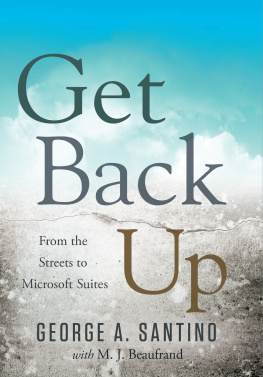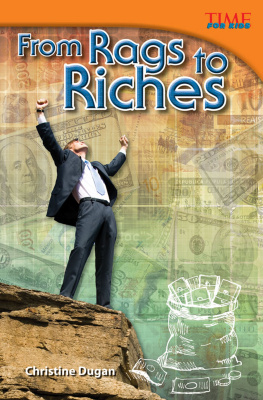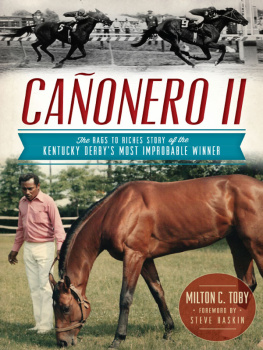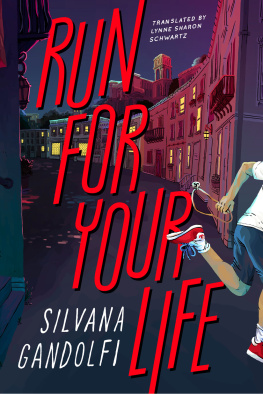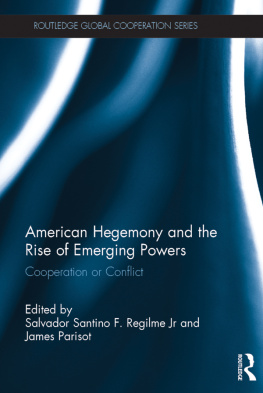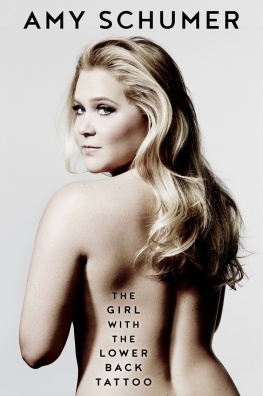Some of the names and identifying characteristics of persons referenced in this book have been changed to protect their privacy.
Published by Greenleaf Book Group Press
Austin, Texas
www.gbgpress.com
Copyright 2016 Santino Enterprises LLC
All rights reserved.
No part of this book may be reproduced, stored in a retrieval system, or transmitted by any means, electronic, mechanical, photocopying, recording, or otherwise, without written permission from the copyright holder.
Distributed by Greenleaf Book Group
For ordering information or special discounts for bulk purchases, please contact Greenleaf Book Group at PO Box 91869, Austin, TX 78709, 512.891.6100.
Design and composition by Greenleaf Book Group
Cover design by Greenleaf Book Group
Cover images: iStock/loops7; Shutterstock/Evgeny Karandaev
Cataloging-in-Publication data is available.
Print ISBN: 978-1-62634-276-7
eBook ISBN: 978-1-62634-277-4
Part of the Tree Neutral program, which offsets the number of trees consumed in the production and printing of this book by taking proactive steps, such as planting trees in direct proportion to the number of trees used: www.treeneutral.com

Printed in the United States of America on acid-free paper
16 17 18 19 20 21 10 9 8 7 6 5 4 3 2 1
First Edition
W hen Suzie said the words for richer or poorer, in sickness and in health, Im sure she had no idea that the early years of our marriage would be nothing but poor and sick. Through it all Suzie supported me and took care of me. No matter what hairbrained get-rich-quick scheme I wanted to try, she was always ready to tell me to go for it. And when I hurt my back and was laid up for years, she was there. Even when I was told I would never work again, she never wavered. She always believed in me, supported me, and had confidence in me. I will never find the words or deeds to thank her or repay her for all she has done for me. But I will never stop trying.
CONTENTS
PROLOGUE
T he first time I see a baseball bat used on a human face is in 1967.
My brother Dennis and I are in Lanier Park, close to the Tasker Street Projects in South Philly. Dennis is twelve; I am eleven. Were supposed to be playing baseball.
Theres a possible double play, with a player on first. The man at bat hits a ground ball to the shortstop. The shortstop fields it and throws it to the second baseman, who tags the base. One out.
The second baseman gets ready to throw the ball to first base to complete the double play. We all know the guy running to second should try to take him out by sliding low and hard. But instead of sliding at the second basemans legs to knock him down, he jumps into the air and drives his shoes, cleats and all, into his legs. He tears the second basemans calf open.
The second basemans scream is loud, and blood pours from the gash.
Dennis and I are standing near third base, so we see exactly what happens next.
The benches are suddenly empty. Punches are thrown, and soon baseball bats are being used on something other than baseballs.
I still remember the sounds of the bats hitting bodies. Its like a fighter hitting a heavy punching bag.
One bat hits a guy right in the face. It looks like his skin has been ripped off. You can see the faces shape, but where the skin should be, theres only blood and bone.
At first, I just stand there watching. I know I should be worried, but somehow Im not. But Dennis knows this isnt a time to stand out in the open. He grabs me and forces us both under the bleachers. My brother has a baseball bat of his own, and I know he wont hesitate to use it if someone comes looking for us.
Nobody bothers. We keep hiding there, while over on the baseball diamond, kids are still using bats on each other, hitting skulls and backs and bodies. It seems to go on forever.
Then the cops show up and start swinging their batons, and we escape.
I dont think we went to another game at the park.
Im not sure if Lanier Park even had another game.

Nobody ever handed me anything.
My family was on welfare, and then we werent, and then, when my fathers business closed, we were again. I can tell you, firsthand, about the taste of government cheese, or the ends of bologna when bologna itself is too expensive to feed a family of nine.
I never finished college. I joined the army, but I left without finishing basic training because of a Service Connected Disability.
After a debilitating back injury, I was told that I would never work again.
With a partner, I opened a business that thrived and expanded before failing completely.
I interviewed with the Microsoft Corporation four times before getting a job.
And yet, after all of that, I retired at fifty-five from a position at Microsoft with the title of Partner Engineering Manager and enough of a nest egg to ensure that neither my wife nor any of my four children will ever have to know what the ends of bologna taste like, or have to cower under bleachers for fear that theyll get hit in the face with a baseball bat.
Ive lost count of the times when life has knocked me down, or when I was told that there was something I couldnt have, or that I wasnt good enough, or that my body was too damaged for me to hold any kind of job. But every time life tried to beat me down, I learned something.
And each time, I got back up.
One
TASKER STREET PROJECTS
W henever someone says South Philly Projects, one word almost always comes to mind: rough. But if you grew up in the country or the suburbs, your idea of rough might be different from mine.
My last name, Santino, means Little Saint in Italian. It definitely didnt describe any of us.
My father, John Santino, was a salesman, and from what I heard, he was a good one. He fashioned himself after Frank Sinatra, with the fedora and the smooth voice and everything. He certainly sold one of the most difficult products anyone ever had to move: himself.
When he was twenty-eight years old he met my mother, Florence, a sweet girl of eighteen who worked at the West Philly Five and Dime. The lunch counter was close to where he sold shoes, so Dad would stop by. He stopped by more and more often as time went on. He sold himself as a charming bachelor, and my mom bought him.

By the time I was born in 1956, the fourth of what would be seven kids, Dad was not a salesman anymore. He may have been charming outside the home, but he wasnt to us.
As I first remember him, I was four years old and he was forty. He was already a beaten-down old man.
At first, my sisters and brothers and I thought that our lives were no different from anyone elses. My parents always put food on the table and presents under the tree at Christmas. It didnt matter that our Thanksgiving turkey came from the church or that our presents came from the Salvation Army. The fact that my father didnt go off to work didnt seem strange. We knew he was disabled because hed filed for Social Security disabilitya check we didnt see until years later. But we didnt know what was wrong with him.

